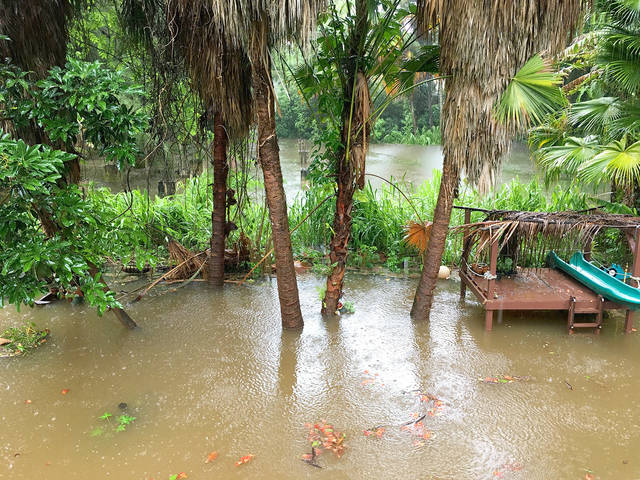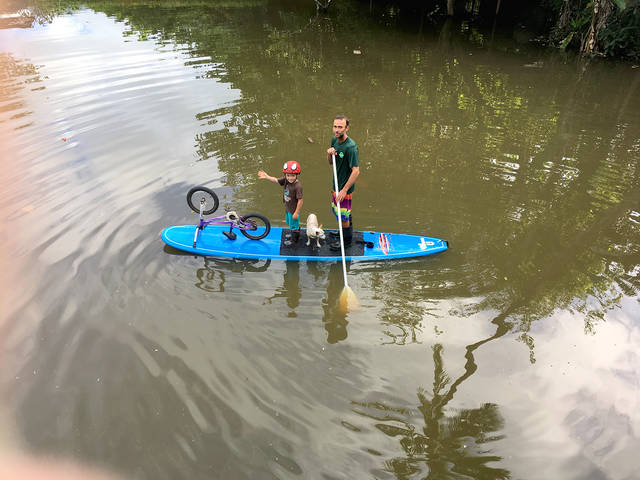HAENA — It only took the Ewings two days to get the water out of their yard after the August storm. That’s an improvement, since it took two weeks to get rid of the water after the April floods.
Until county wastewater workers pumped the water out of their yard a couple weeks ago, the family’s only way of getting in and out of their home was using a stand-up paddle board.
Lindsey Ewing is pregnant. She and her son, husband Richard Ewing, and father-in-law live on Alamihi Road in Haena. Their yard still has standing water in it.
During the April flood, there was about 50 inches of rainfall. In August, they got about 20 inches.
She said the flooding that swept through their yard turned it into a world of water not once but twice.
“It was out of our control,” Ewing said. “At some point you can only do so much. I definitely had some anxiety.”
Fortunately for the Ewing family, the damage this time was minimal. Like many people though, they are still recovering.
“The first time we lost $10,000 easily,” Ewing said. “We lost lawn mowers, our stove, dryer and water heater,” and more. Much of what was lost were tools and equipment that her husband used for his landscaping job.
Losing belongings with sentimental value is what’s most heartbreaking, Ewing said.
“Appliances, lawn mowers, those kinds of things we can replace, but we lost family photographs, grandfather clocks, family keepsakes,” she said.
Ewing saw most of the water come through their yard from behind their property on the right side.
“Water flooded starting at Kuhio (the highway) side, and then filled up at Mikala Place, and flooded in toward our house and through the yard,” she said. “It would flood every four to six years but nothing like in April or even this most recent flood.”
The road at Mikala Place was built over 50 years ago, and other houses in the area sometime after that. Since then, according to Ewing, water does not empty out the way that it used to.
“There is no runoff,” she said. “We are the runoff.”
Another issue is that the nearby ditch system overflows after heavy rains, she said.
The ditch begins in pastures owned by the Robinson family across from her house.
The ditch crosses underneath Alamihi Road and then continues through Hanalei Colony Resort property after passing under the highway, then reaches the ocean.
There are also culverts that were built along Alamihi Road for the purpose of redirecting water.
The Ewings said that although the Hanalei Colony Resort has maintained the section of ditch that runs through its property, the ditch system and culverts are in disrepair, and one of the four culverts has collapsed.
Standing water still remains in the road and on other properties, such as that of Toby Searles, who lives near the Ewings on the mauka side of Alamihi.
Searles, who was forced to put his bed-and-breakfast on hold after the April floods, said water came into his back yard from behind his property, from over a hill just beyond it.
He had to pump out the water himself, and though he got a lot out, there’s still more remaining. Searles was surprised the water flowed over the hill; he has never seen that happen before.
He hiked past the hill and through the land behind it to follow the path the water took. The path led to near the dump at Kepuhi Point. Searles concluded that the dump must have blocked water from running out into the ocean, and so it got backed up, then flowed the other direction, and ended up flooding behind his home instead.
“What happens is what happens, because there’s not much you can do,” he said.
When it comes to addressing future problems related to flooding in the area, starting the conversation is a step in the right direction, but North Shore residents like the Ewings and Searles said they would like to see more done.






Glad your family is safe Ricky.